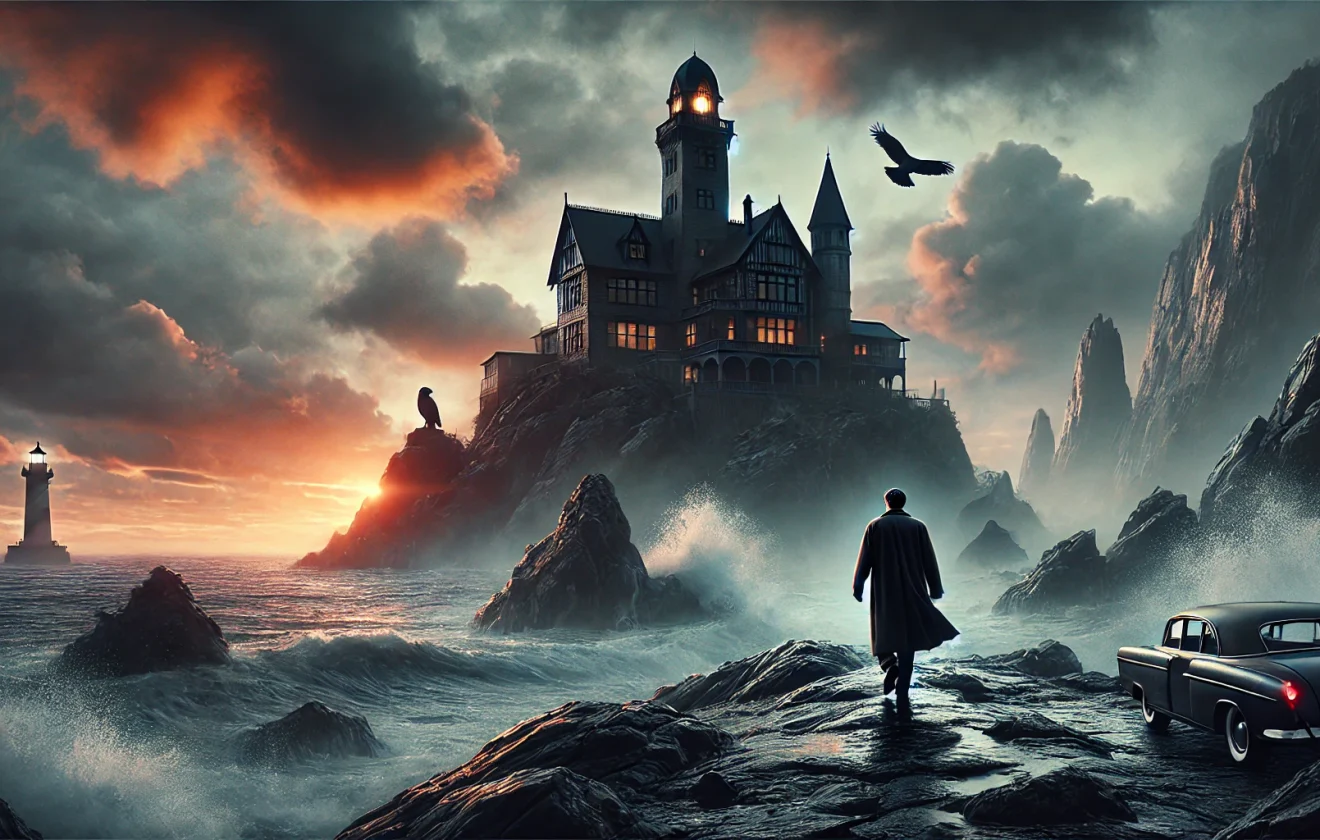Shutter Island: A Deep Dive into Psychological Turmoil and Cinematic Brilliance
Shutter Island is a cinematic marvel directed by Martin Scorsese in 2010. Adapted from Dennis Lehane’s acclaimed novel, the film is both a psychological puzzle...

- 1
Main Cast
Leonardo DiCaprio, Mark Ruffalo, Ben Kingsley, Michelle Williams
- 2
Release Year
2010
- Director
Martin Scorsese
- Genre
Psychological Thriller, Mystery
- Box Office
Grossed over $294 million worldwide.
- Awards
Nominated for Saturn Awards (Best Thriller, Best Actor for Leonardo DiCaprio).
Shutter Island is a cinematic marvel directed by Martin Scorsese in 2010. Adapted from Dennis Lehane’s acclaimed novel, the film is both a psychological puzzle and a thriller, exploring profound themes such as identity, trauma, and the ethical boundaries of psychiatry. Leonardo DiCaprio’s portrayal of U.S. Marshal Teddy Daniels brings the audience into a world where the lines between reality and illusion are meticulously blurred. From its atmospheric visuals to its chilling narrative twists, Shutter Island challenges its viewers to question the reliability of perception.
The film’s intrigue lies not only in its plot but also in its layered exploration of the human psyche. Through its haunting dialogues, meticulously crafted scenes, and a keyword-rich narrative, Shutter Island has cemented its place as a masterpiece in modern cinema.
Plot Overview#
At its surface, Shutter Island narrates the investigation of a missing patient, Rachel Solando, from Ashecliffe Hospital, a secluded psychiatric facility on the titular island. U.S. Marshal Teddy Daniels, accompanied by his partner Chuck Aule, embarks on a mission that quickly becomes a labyrinthine journey of secrets and self-discovery.
The narrative unfolds with flashbacks of Teddy’s past—his traumatic experiences during World War II and the tragic death of his wife Dolores, who died in a fire allegedly started by Andrew Laeddis, an arsonist. These memories seem to fuel Teddy’s resolve, yet they gradually intertwine with his investigation, revealing deeper psychological complexities.
As Teddy delves deeper into the case, he uncovers sinister experiments purportedly conducted on patients, further exacerbating his mistrust of Ashecliffe’s staff, including Dr. Cawley and Dr. Naehring. However, the plot’s climax subverts all expectations, revealing that Teddy Daniels is, in fact, Andrew Laeddis, a patient at Ashecliffe. His entire investigation is a therapeutic role-play designed to confront his denial about his role in the tragic death of his wife and children.
Themes in Shutter Island#
| Theme | Description | Key Examples |
|---|---|---|
| Identity and Perception | Explores how trauma shapes and distorts individual identity. | Teddy’s transformation into Andrew Laeddis challenges the audience’s understanding of identity. |
| Ethics in Psychiatry | Examines the moral dilemmas of psychiatric treatments in mid-20th century medicine. | Ashecliffe’s experimental therapies highlight historical controversies in mental health care. |
| Trauma and Memory | Investigates how memories, especially traumatic ones, influence reality. | Teddy’s flashbacks to his time in WWII and Dolores’s death blur the boundary between past and present. |
| Reality Versus Delusion | Questions the reliability of personal and collective realities. | The climactic revelation forces viewers to reevaluate the film’s events through the lens of Teddy’s delusions. |
| Isolation | Uses the island setting as a metaphor for psychological isolation and entrapment. | The storm-laden island reflects Teddy’s mental turmoil and his inability to escape his constructed reality. |
Psychological Layers: Analyzing Andrew Laeddis#
The character arc of Teddy Daniels/Andrew Laeddis is the linchpin of the film’s narrative complexity. The following dialogue exemplifies his internal struggle:
“Which would be worse: to live as a monster or to die as a good man?”
This poignant question encapsulates Andrew’s existential dilemma, highlighting the tension between self-preservation and accountability.
Andrew’s transformation into Teddy Daniels serves as a defense mechanism against his guilt over Dolores’s murder of their children, an act triggered by her untreated mental illness. His constructed persona allows him to live in denial, shifting blame onto an external figure, Andrew Laeddis, who is in fact his true identity.
Directorial Brilliance#
Martin Scorsese employs a masterful combination of visual storytelling, sound design, and nonlinear narrative techniques to immerse viewers in Teddy’s fractured psyche. The island itself is a character, its ominous landscapes and gothic architecture reflecting the protagonist’s mental state.
Key Directorial Techniques:#
- Visual Symbolism:
- The storm battering Shutter Island mirrors Teddy’s inner chaos.
- The use of shadows and distorted reflections emphasizes themes of duality and hidden truths.
- Nonlinear Storytelling:
- Flashbacks and hallucinations are interwoven seamlessly, keeping the audience as disoriented as the protagonist.
- Sound Design:
- The unsettling score by Robbie Robertson amplifies tension, while strategic silences heighten moments of revelation.
Performances and Character Dynamics#
The performances in Shutter Island elevate its narrative. Leonardo DiCaprio delivers a tour de force as Teddy Daniels/Andrew Laeddis, seamlessly transitioning between determination, vulnerability, and despair. Mark Ruffalo’s portrayal of Chuck Aule provides a subtle counterbalance, revealing his character’s dual role as a partner and an Ashecliffe doctor.
Ben Kingsley as Dr. Cawley exudes an ambiguous authority, leaving viewers questioning his motives until the very end. Michelle Williams’s haunting depiction of Dolores adds emotional depth, particularly in the flashback scenes that unravel the truth behind Andrew’s trauma.
Cinematic Elements#
Cinematography#
Cinematographer Robert Richardson’s use of lighting and framing is integral to the film’s atmosphere. The interplay of light and shadow not only enhances the gothic tone but also symbolizes Teddy’s struggle between reality and delusion.
- Example Scene:
In the lighthouse, where the climactic truth is revealed, the harsh lighting creates stark contrasts, visually representing Andrew’s confrontation with his inner darkness.
Editing#
The film’s editing, led by Thelma Schoonmaker, manipulates time and perspective, aligning the audience’s experience with Teddy’s disorientation.
Ethics in Psychiatry: A Historical Lens#
Set in the 1950s, Shutter Island reflects the era’s experimental and often controversial psychiatric treatments, such as lobotomies and psychotropic drugs. Ashecliffe Hospital embodies this tension, raising questions about the ethics of these practices.
Historical Context:
- Lobotomies, widely practiced in the mid-20th century, were often criticized for their dehumanizing effects.
- The emergence of psychotropic medications revolutionized mental health care but also sparked debates about control versus care.
The film juxtaposes Dr. Cawley’s seemingly compassionate approach with Dr. Naehring’s clinical detachment, symbolizing the conflicting ideologies within psychiatry.
Strengths and Limitations#
| Strengths | Limitations |
|---|---|
| Complex narrative that challenges conventional storytelling. | Requires careful attention, which may alienate casual viewers. |
| Stellar performances from a well-rounded cast. | The heavy psychological themes may feel overwhelming for some audiences. |
| A thought-provoking exploration of ethics, identity, and perception. | Some viewers may find the twist ending predictable upon subsequent viewings. |
Conclusion#
Shutter Island is a masterclass in psychological storytelling, combining gripping suspense with profound thematic depth. Scorsese’s direction, coupled with DiCaprio’s career-defining performance, creates an unforgettable cinematic experience that lingers long after the credits roll. The film’s exploration of identity, trauma, and the ethical boundaries of psychiatry ensures its relevance in both cinematic and academic discussions.
For those seeking a film that not only entertains but also challenges their perception of reality, Shutter Island remains an unparalleled choice. Its legacy as a psychological thriller will undoubtedly continue to captivate and provoke thought for generations to come.














The AI regulation and compliance section is spot on. With the rise of AI adoption, ethical considerations will be crucial.…